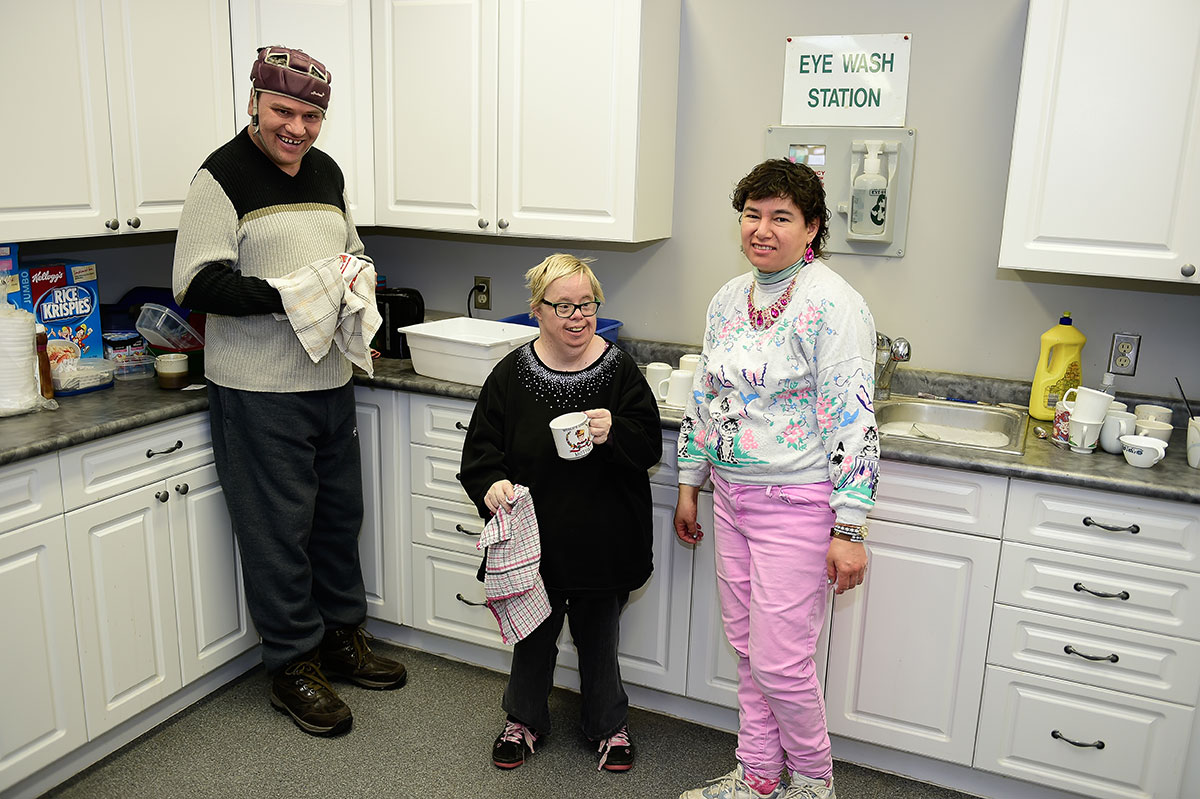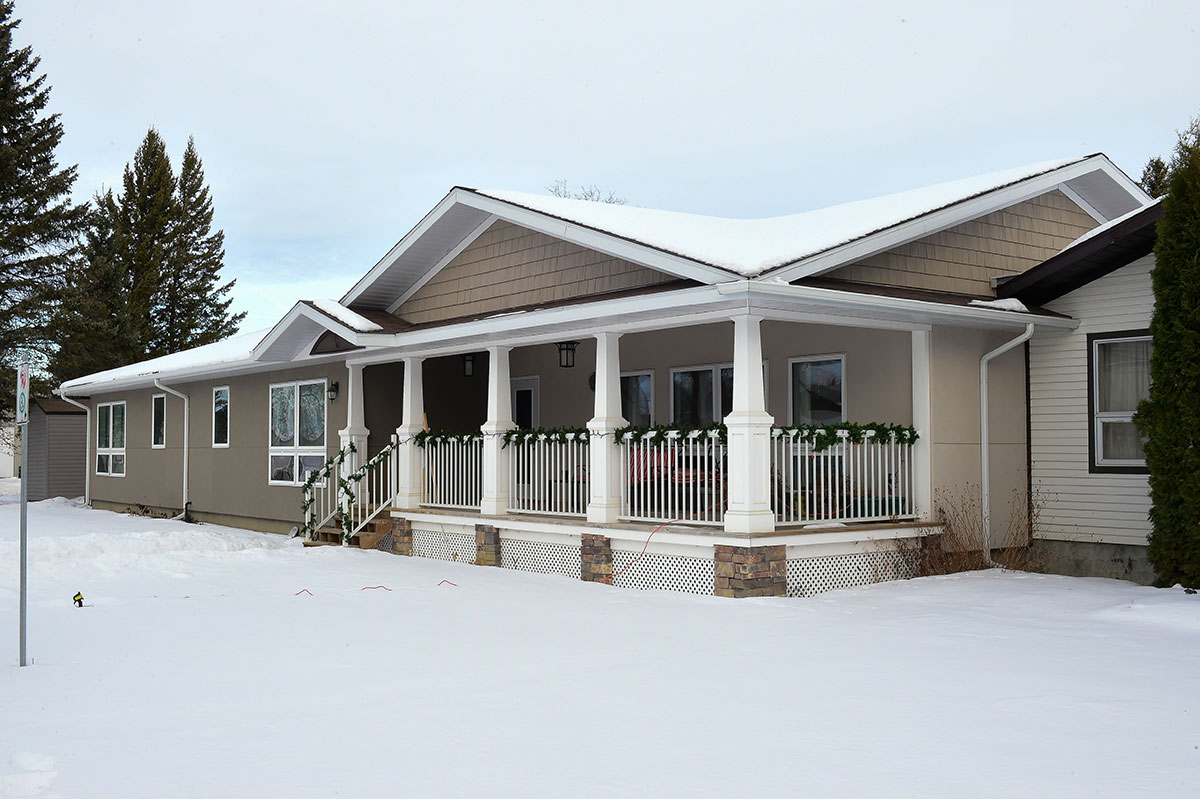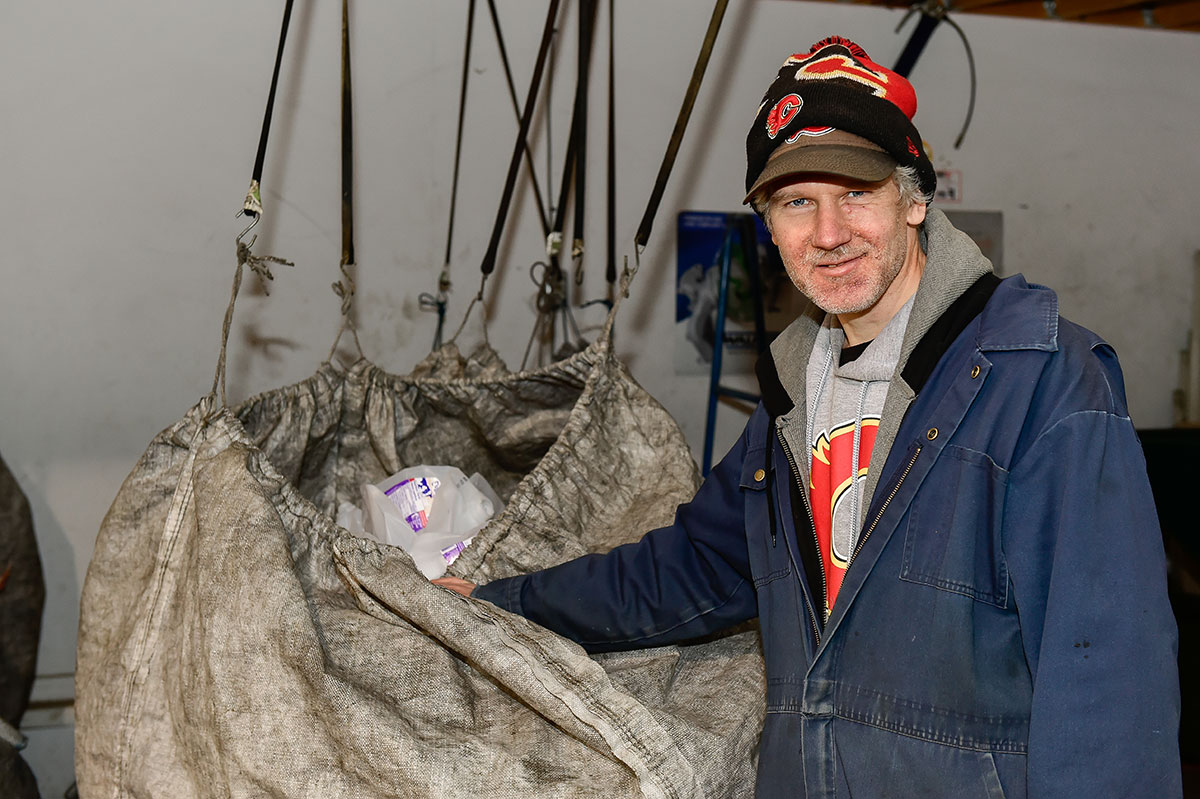POP Development Timeline
1970: Parents of individuals experiencing disability formed one of the first branches of the Saskatchewan Association of Community Living (SACL).
1974: Porcupine Opportunities Program (POP) was incorporated as a not-for-profit charity by some of the parents involved in the local SACL group.
1984: The number of directors for POP was expanded to accommodate the formation of a new community Board of Directors.
1985: A new 4500 square foot facility was built that housed the day program, wood workshop and administrative offices in Porcupine Plain. POP partnered with the Province of Saskatchewan to establish a three-bedroom Saskatchewan Housing rental to support individuals in semi-independent living.
1988: POP's first residential group home (Playtondale) opened.
1989: POP shipped its first core boxes on a flat bed. The 3500 boxes were destined for a mining exploration site north of LaRonge, Saskatchewan.
1991: POP purchased a furniture store in downtown Porcupine Plain and converted it into a laundromat and associated office space.
1994: A four-plex apartment suite in Porcupine Plain was purchased for the purpose of providing residential services for individuals requiring supported living.
1995: POP opened the first paper recycling depot for the Town of Porcupine in partnership with the town on a six-month trial basis. The recycling program was closed approximately 19 years later, when a large regional waste disposal firm started offering services in the area.
1996: POP's second residential group home, Alex Bloski Manor, was built as a modular home and moved onto a residential site on Cooper Street in Porcupine Plain. The 4600 square foot home was later named in recognition of a long-time Board member, Alex Bloski.
1997: A SARCAN facility was built as an attachment to the laundromat plaza in Porcupine Plain.
1999: POP celebrated its 25th anniversary.
2001: A satellite vocational program, with eight spaces, was established in Hudson Bay.
2004: An Enhanced Supported Living residential program, consisting of two two-bedroom suites, was added to Alex Bloski Manor. The facility was a showcase within the province as it provided a bridge between a group home and semi-independent living.
2008: The school division office in Hudson Bay, built in 1981, was purchased and renovated in order to set up a SARCAN depot in Hudson Bay.
2010: The agency purchased a four-bedroom, two-storey home in Porcupine Plain to provide residential services to individuals requiring supported independent living. This home was operated until 2018 when it was sold due to a change in housing needs within the agency.
2012: The New Group Home (NGH), which is 3393 square feet and provides accommodation for five residents, was opened in November 2012 as a collaborative project of POP, the Ministry of Social Services and Sask Housing. The province provided $500,000 in capital funding in addition to annualized operating funding. A new 3800 square foot enhanced living residence involving three one-bedroom suites, and one two bedroom suite, a meeting room, and a laundry room was opened as an extension of the Playtondale Residence on 1st Avenue. This innovative program was initiated by POP to give participants of the program greater independence and potential transition to independent living.
2014: A 2100 square foot (60 × 35) coverall shelter was added to the workshop to provide storage for core boxes.
2017: The agency started to produce spacers (dunnage) for the lumber industry. This added new equipment and four full time staff in the workshop in addition to the existing staff and program participants.
2018: A 3000 square foot (75 × 40) wood framed warehouse was added to the property to provide additional storage for POP's wood products including the new dunnage products.
2019: The agency renovated its laundromat and began providing fee for service washing as part of its supported employment program. A small gift shop and consignment store featuring products made by regional artisans was set up in POP's business plaza as part of the agencies supported employment program.
2022: The agency was successful in obtaining $ 805,000 in funding from PrairieCan, a federal economic development agency. The funding is supporting a renovation and 3600 square foot expansion of the agency's workshop to facilitate continued production of core boxes and dunnage. It will also add dedicated space for a small wood shop that will produce wood furniture, bird houses, and other such items as another component of POP's vocational program.
POP is one of appoximately 100 community-based organizations across Saskatchewan which provide support to adults experiencing disabilities. The agency has grown from its initial roots into a vibrant organization offering a range of residential, vocational, and recreational programs and services.
An integral part of the fabric of the local community, POP employs over 50 staff in full- and part-time positions and operates with a budget of close to four million dollars. The bulk of these dollars are returned to the community and the surrounding region through staff wages and through the purchase of goods and services to support program participants.
With its main office in Porcupine Plain, the services offered by the agency include:
Vocational Programs
- Day programs in Porcupine Plain and Hudson Bay.
- A seniors' program.
- A commercial wood production shop in Porcupine Plain.
- Community-based employment.
- Two SARCAN recycling depots.

Residential Programs
- Sixteen spaces in three group homes in Porcupine Plain.
- Eight enhanced supported living spaces in one- and two-bedroom suites in Porcupine Plain.
- Additional opportunity for living accommodation in a four-plex apartment in Porcupine Plain and with Sask Housing spaces in Porcupine Plain and Hudson Bay.

Businesses
- Two SARCAN recycling depots, one in Porcupine Plain and one in Hudson Bay.
- Core box production for the mining sector and dunnage production for the lumber industry through the industrial wood production shop.
- A laundromat and associated services in Porcupine Plain.
- A gift store featuring products made by local crafters and artisans.
- Two business rental offices in Porcupine Plain.
- A four-plex apartment with suites that are available to the public and/or able to support the residential program as needed.
POP continues to grow, adapt, and respond to the changing needs of participants as it strives to fulfill its mission of enhancing the quality of life for its participants.

History
Porcupine Opportunities Program (POP) has a rich history intermingled with that of the broader disability sector. In 1974, a group of parents, already involved in the local Saskatchewan Association of Community Living (SACL) chapter, embarked on a visionary project to establish a facility that would provide employment, at "real wages", for individuals experiencing disabilities in the community, as well as those graduating from the special education classes. They felt that such a program would provide the opportunity for individuals to live and work in, or close to, the communities in which they had been born and raised.
With their own money and donations from the community and the local Lions service club, the group purchased 27 acres of land on the south side of Porcupine Plain. The parent group then moved a two room school house from Somme, SK to the site and set it up on a basement foundation. A day program was set up in one room, with storage and administration in the second room, while a small wood workshop was set up in the basement of the old school house. This formed POP's infrastructure to start providing services and support to nine individuals.
Initial operations at POP were largely built around Canada Manpower grants which were provided on a limited time basis for specific projects. A limited, more regular income, came from contracts with local businesses such as building grain bins for the local farmers and the Co-op. The beginnings of what would later become the main revenue source for the agency, core box production for mining companies, was also established. However, without a solid operating revenue, and relying only on a series of local managers to maintain operations, the organization was starting to falter by the end of the 1970s.
Carl Kwiatkowski was the last manager hired by the parent group, and when they reluctantly faced the decision to close operations, it was he who orchestrated "keeping the dream alive" by transitioning from the parent group to a community-based board with basic operating revenue provided by Social Services. Over two dozen groups were represented at the initial meetings. Some of the groups offered support but declined to participate directly, while others agreed to an appointment on the new Board of Directors.
The first board involved appointments from:
- Porcupine Plain Chapter, Saskatchewan Association for the Mentally Retarded (SAMR)
- Hudson Bay Chapter, SAMR
- Porcupine Plain local hospital board
- Porcupine Plain local school board
- Hudson Bay School Division
- Lions Club
- Town of Hudson Bay
- Town of Porcupine Plain
- RM of Porcupine Plain
- RM of Kelvington
- RM of Bjorkdale
- RM of Hudson Bay
Later the Porcupine Plain Kinsmen and Regional Mental Health groups also appointed representatives to the board.
Over the years, financial circumstances and changes in local organizations gradually reduced the number of appointments. Currently only the town of Hudson Bay and the RM of Kelvington still appoint board members with all other board members appointed at large.
In the early 1980s, the board determined that a new facility was needed and plans for building the current POP Centre were developed. In 1984, the new office, day program and a new woodworking shop were opened on the site involving a sod-turning ceremony that included former Prime Minister Joe Clark and Saskatchewan Social Services Minister Gordon Dirks. Provincial funding of $150,000 and a sizable donation by the Kinsmen of $105,000, made the project possible.
Development of the new facility was largely due to the effort of two local community members, Les Merriman and Ed Poniatowski, who played a lead role in the development of the project. In addition to government financing, local financial contributions came largely through a community fundraising radio-thon talent show.
Participant numbers in the early years were limited by the lack of residential services, with only individuals that lived in or close to Porcupine Plain able to access vocational programming. As the various levels of residential service were developed, the numbers of participants rapidly increased.
The initiation of residential services began in 1985, when POP partnered with the Province of Saskatchewan to provide a three-bedroom Saskatchewan Housing rental to support individuals in semi-independent living. This was followed in 1988 by POP's first major residential development, the 2680 square foot Playtondale group home that cost $195,000 and provided housing for eight residents. The home was built with the support of the provincial government and a number of local and regional organizations including the Kinsmen Foundation, the local Kinsmen's Club, the local Lions Club, and the Hudson Bay Hope Foundation. A "land exchange" with the Town of Porcupine Plain provided a lot in town to POP to build the new home, and a 17-acre parcel of POP's land to the town. This parcel became the future site of the town's Sports Grounds.
The name of this first home, Playtondale, reflected the range of community and regional partners involved in this initiative. It was an acronym of the four municipalities (Porcupine Plain (Pl), Hudson Bay (ay), Kelvington (ton), and Bjorkdale (dale)). This was the first step to providing a more-independent living experience for people that, up until then, were forced into a less independent institutionalized environment.
Subsequent developments for residential programing included the construction of two more group homes, one in 1998 and a second in 2012. Two enhanced supported living homes were constructed in 2004 and 2012. A four-plex apartment, purchased in 1994, provided supported living to a number of individuals. The agency also purchased a home in 2010 to provide additional supported living space to participants although this home has since been sold as residential needs evolved.
Additions to the business programing include the laundromat (1991) and two recycling depots (1997 and 2008). Most recently, POP has renovated its laundromat and is now offering custom laundry services. The agency also opened a gift store, that sells consigned items produced from local crafters and artisans, and products produced by POP participants and staff. Both the laundromat and the gift store are a core component of POP's supported employment program.
These developments as well as improvements and changes to the existing infrastructure are outlined in the development timeline.

